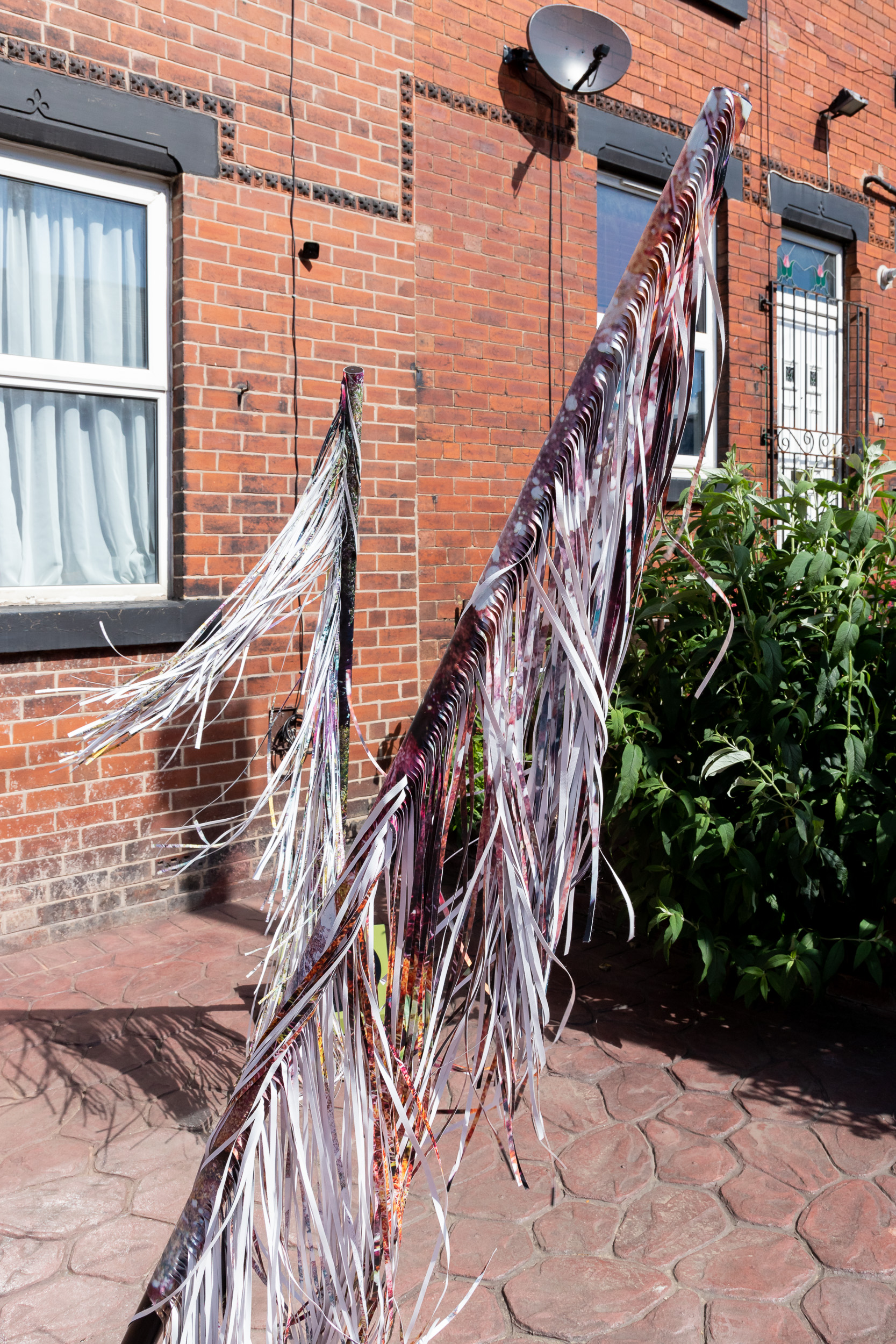Victoria Lucas: The Strata of Things
Review by Uthra Rajgopal
Fringes above fractured stones arrest my attention. Precariously leaning forward, dangling along angled poles: they call me closer. I cross the cobbled road. Like a shredded flag or a unicorn’s mane. Clean cuts. I see vinyl strips with vivid flashes of ultraviolet spiky leaves, speckled pink stones and sun-kissed moss. Three, free-standing sculptures, each anchored into its own moss-green base, planted in a courtyard-style front garden, amongst a row of red brick back-to-back terraced houses. I have entered Threshold. Founded by Julia McKinlay. A completely new concept for an outdoor sculpture space in Burley, a domestic setting, on the outskirts of Leeds city centre. Everyone is talking about it. Curiosity is buzzing. Nosy neighbours are welcome. And this is the exhibition of Victoria Lucas, The Strata of Things.
The site and Lucas’s sculptures work in brilliant, constant dialogue. They both demand that we look beyond, beneath and in between the layers of the urban and geological landscape. For Lucas this work emerges from her ongoing research into the construction of ‘feminist heterotopias’ through the deconstruction and reclamation of land, using the ‘old quarry’ in Derbyshire as a case study, ‘to excavate and redefine female subjectivity’.1 Part of a practice-led PhD at Sheffield Hallam University, Lucas has developed a series of works exploring and challenging how we construct and reclaim a ‘site’.
Over thousands of years, sediment, minerals and vegetation have been compressed into layers and layers of rock, slowly depositing and building over time. With the rise of the industrial revolution, the demand for stone led to huge areas of land being violently scooped open, ripping and tearing apart the natural landscape. Through this extraction the histories of the voices and hands of women became trapped, hidden or erased, and in this new work we see how Lucas reclaims and reconstitutes these histories, quite literally depositing them on our doorstep.
In the same way, we can see how the terraced houses of Burley, carry histories of domestic and factory labour, feeding the wealthy, fuelling their consumption, stripping them down to their bare bones. What stories do those houses tell? Yet the voices of the women and the sounds of the land we can no longer hear, seem to be captured in the whispers of the sculptures. Lucas’s manipulated digital prints of the quarry, toss and swing in the wind, revealing and concealing the land, murmuring between the earth and sky. As you move around each sculpture, the hard metal black poles reveal their stamina and are echoed in the black drainpipes and electrical wires above. I spent a long time looking, swaying, swishing and crouching around these sculptures. They are quite mesmerising, sitting on the liminal spaces between kinetic and textile sculpture, protest and violence, brute strength and decimation, occupying a site that is both domestic and public.
If I had to recommend one exhibition you must see and experience in person (if you can) this summer, it would be The Strata of Things. Like the swirling minerals in the ground beneath our feet, sprinkled with earth’s natural treasures, the combination of these jostling sculptures, on the fringes of the city, is the perfect whipped ice cream.
The exhibition is open from 12 June until 10 July 2021. Free entry. Open to view from the street. Please follow the latest guidelines for visiting. See the information page for visiting information.
The Strata of Things is the second exhibition to be held at Threshold. Threshold is supported by Arts Council England, Leeds Inspired, East Street Arts, CuratorSpace and Index Festival.
1 Lucas, quoted in the accompanying exhibition booklet for The Strata of Things.

Uthra Rajgopal is an Independent Curator with a specialist interest in South Asian textiles. In 2019, Uthra won the prestigious Art Fund New Collecting Award to build a collection of contemporary textile artworks for the Whitworth in Manchester, specifically artworks made by women artists working in Pakistan, India and Bangladesh and the UK diaspora. In 2021 Uthra was appointed as Lead Curator on the Banu Rangoonwala Sculpture Terrace, part of the South Asia Gallery at Manchester Museum, in partnership with the British Museum, due to open in Autumn 2022. Uthra is a keen advocate of championing and expanding the field of textile arts.
